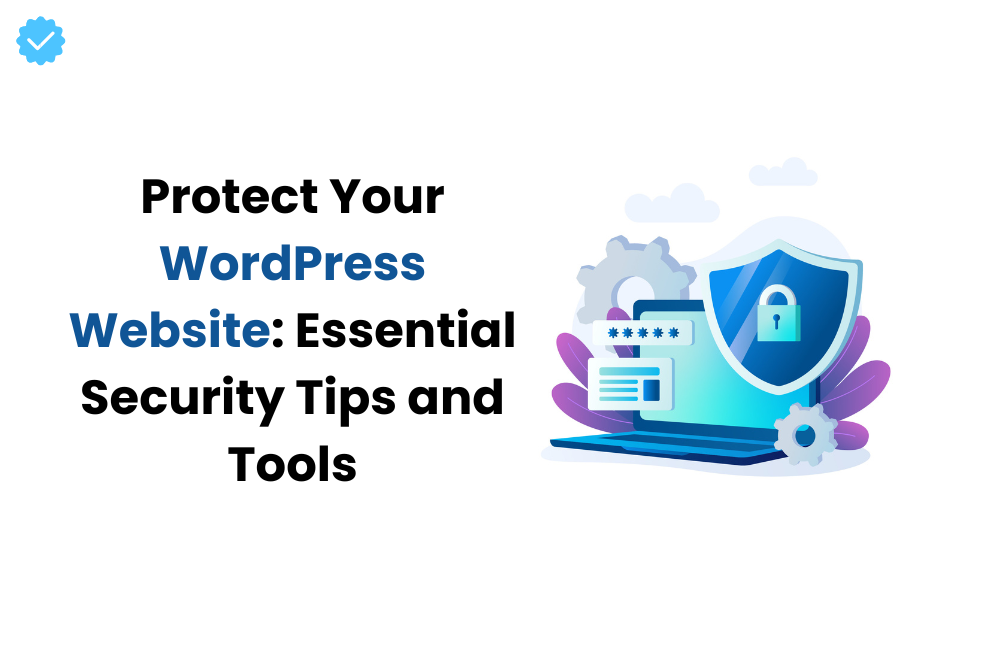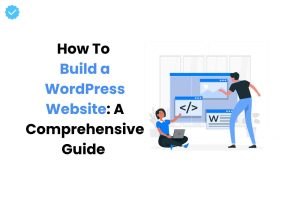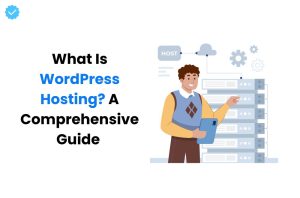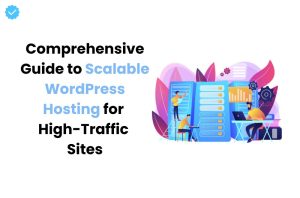With 43.2% of all websites wielding the power of WordPress, it’s no surprise this Content Management System (CMS) reigns supreme. However, this popularity comes with a double-edged sword. While WordPress offers a user-friendly platform, it also attracts cybercriminals seeking to exploit security vulnerabilities.
The good news? Not all security breaches stem from WordPress itself. Many can be attributed to a lack of user awareness. Taking proactive measures can transform your website from a potential target into a digital fortress.
In this latest guide, we’ll equip you with the knowledge and actionable steps to fortify your WordPress security and keep your valuable data safe.
Why Do You Need to Secure a WordPress Website?
WordPress is a fantastic platform for building sites, but its popularity also makes it a target for hackers. Securing your WordPress website is essential to protect yourself from a variety of threats, including:
- Data Breaches: If your site is not secure, hackers can steal sensitive data like customer information or login credentials. This can destroy your reputation and lead to financial losses.
- Malware Attacks: Hackers can inject malicious code into your website, infecting visitors’ computers or stealing their information. This can damage your website’s reputation and make it unusable.
- Search Engine Ranking Issues: Search engines like Google prioritize secure websites. A hacked website can be penalized by search engines, making it harder for visitors to find you.
By taking steps to secure your WordPress site (like using a secure WordPress hosting provider, keeping your software updated, and using strong passwords), you can prevent these problems and keep your website safe. There are many resources available online to help you learn how to protect your WordPress website from hackers. Investing in WordPress security now can save you a lot of time, money, and stress down the line.
How to Use WordPress Security Plugins?
WordPress is great, but since it’s so popular, it can be a target for hackers. Plugins security for WordPress sites can help protect your site. Before choosing one, let’s check out some key features to make sure you get the right one for your needs:
Two-factor authentication

2FA adds an additional layer of safety to your login process. Even if somebody cracks your password, they’ll still need a unique code (usually from your phone) to access your site. This significantly reduces the harm of unauthorized logins, a common entry point for hackers.
Many WordPress security issues and breaches occur due to weak passwords. 2FA adds an extra hurdle for hackers, making it much more difficult for them to gain access to your website, even if they steal your password. This is a critical security measure to consider, especially if your website stores sensitive information.
Regular Backups
Disasters can strike in the digital world as well. Regularly backing up your website ensures you have a recent copy of your content and settings in case of a security breach, malware infection, or accidental data loss. A good security plugin can automate this process, giving you peace of mind.
Just think, you’ve spent countless hours building your website, crafting compelling content, and attracting visitors. Then, disaster strikes! A security breach or accidental data loss wipes out your entire website. Regular backups are like the safety net in such situations. A good security plugin can automate this process, ensuring you always have a recent backup to restore your website in case of any unforeseen events.
Change Login Page URL
Cybercriminals find the default WordPress login page to be akin to an open invitation. Hackers attack this website using automated tools in an attempt to discover a way inside. However, you may simply safeguard yourself by altering your login URL. WordPress security plugins simplify the URL change process, significantly increasing the difficulty for bots in locating your login page.
This minor adjustment can have a significant impact. You may significantly lower the danger of automated assaults and maintain the security of your website by changing your login URL. It’s a simple step that gives you and your users additional security. Give your website the protection it needs by updating your login URL in a minute.
Monitor User Activity
Monitoring user activity can help you discover questionable behavior. A decent security plugin can monitor login attempts, user activity, and even updates to your website. This helps you to identify possible risks early on and take the required precautions to secure your website.
Vigilance is essential in cybersecurity, just as it is in everyday life. Monitoring user activity on your website can help you discover suspicious behavior, such as unsuccessful login attempts from strange places or odd changes to your website’s content. Early detection enables you to take quick action and avoid any security breaches.
Malware Check

Malicious software (malware) can lurk on your website, collecting user data or redirecting visitors to harmful sites. WordPress security plugins can scan your website for malware on a regular basis, helping you identify and exclude any threats before they cause damage.
Malware can be a silent threat, infecting your website and compromising visitors’ data. Regular automated malware scans are crucial for protecting your website and your visitors. Security plugins can scan your website for malware on a scheduled basis, ensuring that any potential threats are identified & removed before they can cause any damage.
How to Secure Website Without Plugins?
While security plugins offer a convenient way to bolster your WordPress site’s defenses, you can take several effective measures without relying on them. Here’s a breakdown of some key strategies for securing a WordPress website:
Migrate to Secure Web Host

The foundation of your website’s security starts with your hosting provider. Choose a reputable host like WP Provider. We offer managed WordPress hosting and are known for their commitment to WordPress security.
Another thing: while selecting the host, you must look for features like firewalls, intrusion detection systems, and automatic malware scanning. By selecting a secure WordPress hosting company, you can significantly lower the attack surface for malicious actors, making it harder for them to exploit vulnerabilities.
Turn off File Editing
WordPress, by default, offers simple file editing via the admin panel, so not all files can be edited. This functionality, on the other hand, if exposed, can pose a security danger to the system. Restricting the capability to edit files within the admin area reduces the number of doors through which attackers can penetrate. You can still modify theme and plugin files through the FTP (Secure File Transfer Protocol) client.
Restrict Access for .htaccess file
The .htaccess file is extremely important as it helps determine the functionality of your website. It is, therefore, necessary that only authorized personnel should be allowed to access this file. Many hosting providers provide opportunities to protect certain directories. Ensure the .htaccess directory is protected from any changes that may be made by people who wish to tamper with your site, hence making it secure. This is how to protect the WordPress website from hackers.
XML-RPC Disable
XML-RPC is a feature that allows communication with your WordPress site using XML messages. However, it’s not always necessary and can be a target for brute-force attacks. If you’re not using functionalities that rely on XML-RPC, consider disabling it. This reduces the attack surface and makes it more difficult for hackers to gain access.
Hide WordPress Version
Even when updates might contain some security patches, it is better not to display the version number on the site because it gives a hacker a chance to guess possible vulnerabilities. There are certain ways through which one can prevent the details of the WordPress version from being easily identified by the public. This makes it impossible for the attackers to identify certain areas that they can exploit within the networks.
Best Practices for WordPress Security
Many of you might be thinking that securing WordPress sites involves arduous things. Well, that’s not the truth. To secure your WordPress site, you just need to follow the best practices, which include regular updates, tricky login credentials, trusted themes, and more. But relax; there’s no technical knowledge required to keep your website secure. In this section, we’ve covered most of the necessary things to secure your WordPress site.
Keep Your WordPress Version Updated
WordPress releases timely updates. Without more effort, you can install the new software for better performance and security. Despite this being the simplest method, approximately 50% of WordPress websites are making them vulnerable by working on the old version. Wait…
Pause reading for a moment! We don’t mean to interrupt you, but you should inspect your WordPress version and check whether your software version is updated. Start by logging into your WordPress account. Next, go to the dashboard and then the update page. Woo-hoo, UPDATED!
But that’s not enough; you need to keep an eye on your WordPress updates to limit security risks. If you’re using WP Provider’s managed WordPress hosting, your updates are automated, ensuring you’re constantly updated with the latest versions.
Login Credentials of WP-Admin
Well, you’re smart enough to set usernames and passwords, and there is nothing new about this WordPress security tip. But take it as a reminder that hackers know all the tricks and common passwords. Moreover, they’ll try every passcode with the username admin. So, let’s do a quick inspection.
- Are your passwords distinctive?
- Are your usernames difficult to guess?
- Are your passwords up-to-date?
When changing the admin username and password, you must check your network before logging in. Make sure you never connect to HOTSPOT HONEYPOT. As this network is used by many hackers, there is an increased risk of leaking login credentials.
So, we always recommend using a VPN while connecting with a public network. Why VPN? It has an encryption layer that makes it tough to leak information and safeguard your data.
Install SSL Certificate

You might be thinking, is WordPress secure with an SSL Certificate? YES, an SSL certificate build a secure connection between your website and visitors’ browsers. This encryption scrambles data transmission, safeguarding sensitive information like login credentials and credit card details. Securing your WordPress site with an SSL certificate builds trust with visitors and improves your SEO ranking. Most web hosting providers offer affordable SSL certificates, making it an easy and essential step.
Add Captcha
CAPTCHAs (Completely Automated Public Turing test to tell Computers and Humans Apart) are challenges that distinguish between humans and automated bots. When someone tries to log in to your WordPress admin panel, a CAPTCHA might display distorted text or images that the user needs to decipher. This simple test helps prevent brute-force attacks where bots try millions of combinations to guess your password. Implementing CAPTCHAs adds an extra layer of security to your WordPress security.
Limited Login Attempts
Brute-force attacks exploit automated programs to guess your login credentials. Limiting login attempts secures your WordPress site by restricting the number of times someone can try to log in within a specific timeframe. If a certain number of failed attempts are made, the IP address can be temporarily blocked. WordPress security plugins often offer this functionality, allowing you to configure the maximum number of login attempts and the duration of the block.
Conclusion
Securing your WordPress website doesn’t have to be a daunting task. By following the expert tips outlined above, such as using security plugins, updating your software, and employing best practices for login credentials, you can significantly enhance your website’s security.
Remember, investing in WordPress security measures now can save you from potential headaches, financial losses, and reputational damage in the future. Take action today to protect your WordPress site and enjoy peace of mind knowing your online presence is secure.
So, get in touch with WP Provider for managed WordPress hosting, SSL certificates, managed e-mail hosting, and more such services. Contact us now!




